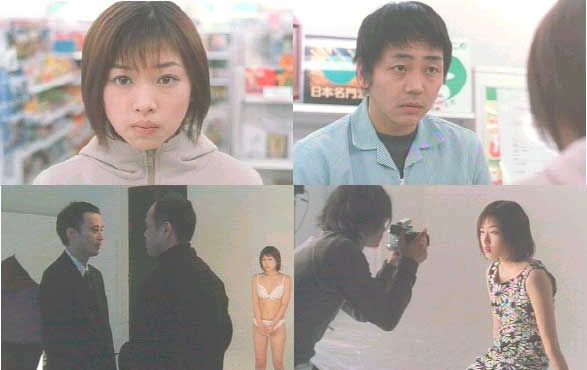Perfect Blue (Yume nara samete)

Director: Toshiki Sato
Year: 2002
Running Time: 101 minutes
Based on a book by Yoshikazu Takeuchi, this film follows on the footsteps
of the much more famous anime version that came out in 1998 that was directed
by Satoshi Kon. Though the same source material inspires both they are very
different in content and style though they each center on a Japanese idol
and her sense of a loss of identity. The anime is bathed in violence and
sexual content while the live version generally keeps a far distance from
both and instead becomes a slow mood piece that never quite ignites. There
is a sense of unease that overlays everything, but one constantly expects
this to turn into something more visceral but even the very strange turn
of events never raises the decibel level. All the characters go through the
film as if in a hypnotic lethargic state or they have indulged too much at
the dinner table.

The adorable Ai-chan (Ayaka Maeda) is a picture perfect idol in the making
with those young girl bright eyed anime features and her manager, Bando (Masahiro
Toda) is doing all he can to foster her climb up the idol ladder. He has
released her poster to some acclaim, but the next steps are to get her in
model layouts, commercials and then the big leap is to have her release an
album. If this all goes well, you have an idol on your hands and a mint in
the bank. He has her pose for one layout in her underwear, but when the photographer
asks her to do various sumo wrestler stances, they refuse, as this is not
the image they want to project. Ai-chan has a melancholy song in her possession
that a friend of hers had written before she committed suicide by jumping
off a building and Bando feels it is the perfect vehicle to launch her singing
career. But there is a question as to how she really acquired this song and
whether she has the moral right to make her career on her dead friends talent.

Ai-chan goes to a convenience store to ship a package and makes the acquaintance
of the clerk Toshihiko (Nao Omori – Vibrator, Ichi the Killer) who seems
to be a huge fan of hers and has her poster on the wall. At first Ai-chan
is thrilled to have a fan, but she gets a little uncomfortable when he seems
to know everything about her – things that no one should know – even inner
thoughts that she has never mentioned to anyone. She accuses him of being
a stalker – but he swears that he is not – instead he explains that he “is
living her (Kyuugoku no Ai)”. He explains that he saw her when he was a little
boy and decided to become her – and he has evolved to the extent that he
knows what she is thinking and doing as she does it. Not surprisingly, this
freaks her out and she runs away – but she soon comes face to face with something
even stranger as his evolution progresses - but is this real or is she
imagining the whole thing.

It’s mildly creepy and suggestive, but it never quite forms into a real movie
and the number of times we have to listen to the song feels very much like
an attempt to fill out the time. This film might have worked better as a
part of an anthology coming in at around 45 minutes. The decision to be so
tame compared to the anime seems especially odd in that the director is one
of Japan’s best know “pink film” makers – termed by whoever makes up these
terms as one of “The Four Kings”of Pink films.

My rating for this film: 5.5





